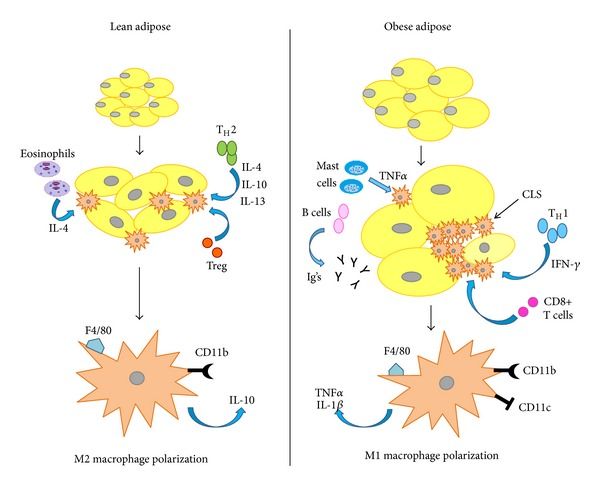All macronutrients are important in optimal immune function, however many patients are obese and overnourished. The typical cause of obesity in patient populations is the overconsumption of high glycemic index carbohydrates and inflammatory fats. Overnutrition is a condition in which nutrients are consumed in excess of body requirements. Overnutrition can produce an energy imbalance between intake and expenditure, resulting in increased energy storage and obesity.1 Overnutrition and obesity have been found to alter immune function. Obesity is associated with adipose tissue macrophage infiltration.2 Inflammation and macrophage-specific genes have been shown to be significantly upregulated in white adipose tissue in hereditary and high-fat diet-induced obesity.3 Insulin resistance resulting from obesity is the result of adipose tissue inflammation causing macrophage aggregation and the production of crown-like structures. At the cellular level, insulin resistance in obesity is caused by the activation of Jun N-terminal kinase- 1 (JNK1) and inhibitor of kB kinase (IKKB), two essential pathways mediating a variety of inflammatory and stress responses triggered in obesity.4 Obesity is associated with chronic, low-grade inflammation, which is believed to play a role in the pathogenesis of insulin resistance in the following ways. In hypertrophied adipose tissue, a variety of alterations exist that can lead to inflammatory states: elevated leptin (pro-inflammatory) and decreased adiponectin (anti-inflammatory) secretion; induction of systemic inflammation via the release of free fatty acids; elevated endoplasmic reticulum stress (resulting in oxidative stress and inflammation) induced by adipocyte growth; and elevated inflammatory gene expression and immune cell activation in hypoxic areas.5 I attempt to address this issue by educating patients on balanced nutrition, including whole foods and balanced macronutrients. I educate on the difference between high and low glycemic index foods and the resulting inflammation and obesity when foods are over-consumed.
References
- Schaible UE, Kaufmann SH. Malnutrition and infection: complex mechanisms and global impacts. PLoS Med. 2007;4(5):e115. doi:10.1371/journal.pmed.0040115
- de Heredia FP, Gómez-Martínez S, Marcos A. Obesity, inflammation and the immune system. Proc Nutr Soc. 2012;71(2):332-338. doi:10.1017/S0029665112000092
- Exley MA, Hand L, O'Shea D, Lynch L. Interplay between the immune system and adipose tissue in obesity. J Endocrinol. 2014;223(2):R41-R48. doi:10.1530/JOE-13-0516
- Patel PS, Buras ED, Balasubramanyam A. The role of the immune system in obesity and insulin resistance. J Obes. 2013;2013:616193. doi:10.1155/2013/61619
- Mraz M, Haluzik M. The role of adipose tissue immune cells in obesity and low-grade inflammation. J Endocrinol. 2014;222(3):R113-R127. doi:10.1530/JOE-14-0283
*These statements are not meant to diagnose or treat. You should consult your health care provider before starting any new diet, exercise, or supplement.

